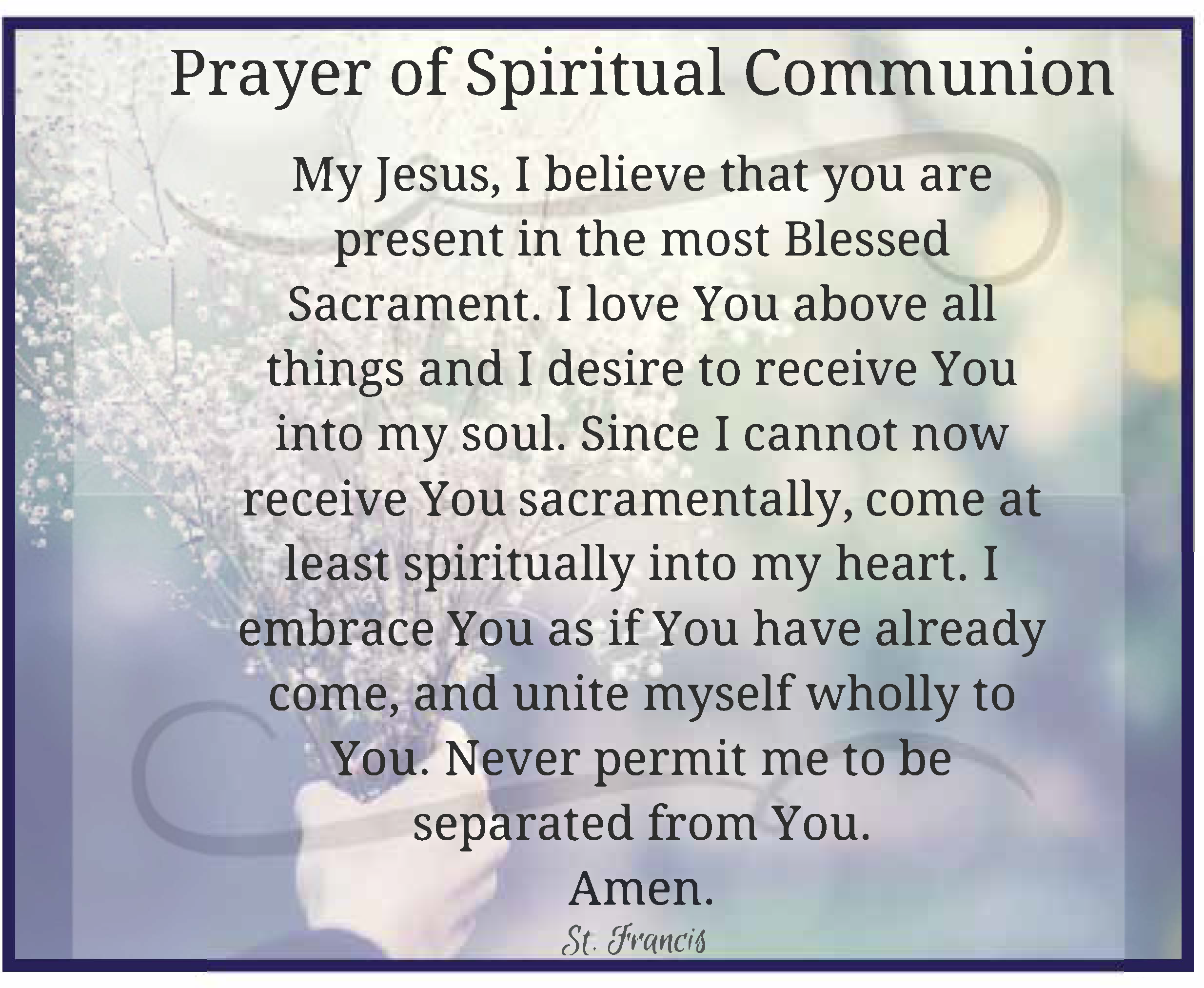Receiving the Blessed Sacrament in the Eucharist is the source and summit of our Catholic faith, but during these unprecedented times and to ensure the health and safety of all people, it is not possible to receive the Sacrament during this time. However, there are still opportunities to draw close to Christ and unite with the Church during these difficult times.
“The Church obliges the faithful "to take part in the Divine Liturgy on Sundays and feast days" and, prepared by the sacrament of Reconciliation, to receive the Eucharist at least once a year, if possible during the Easter season.”
-Catechism of the Catholic Church §1389
There are times we are unable to receive the Blessed Sacrament, but the faithful can always take the opportunity to receive the blessings bestowed upon us through a Spiritual Communion. As noted by Pope Saint John Paul II:
“The Eucharist thus appears as the culmination of all the sacraments in perfecting our communion with God the Father by identification with his only-begotten Son through the working of the Holy Spirit. With discerning faith a distinguished writer of the Byzantine tradition voiced this truth: in the Eucharist “unlike any other sacrament, the mystery [of communion] is so perfect that it brings us to the heights of every good thing: here is the ultimate goal of every human desire, because here we attain God and God joins himself to us in the most perfect union”. Precisely, for this reason, it is good to cultivate in our hearts a constant desire for the sacrament of the Eucharist. This was the origin of the practice of “spiritual communion”, which has happily been established in the Church for centuries and recommended by saints who were masters of the spiritual life. Saint Teresa of Jesus wrote: “When you do not receive communion and you do not attend Mass, you can make a spiritual communion, which is a most beneficial practice; by it the love of God will be greatly impressed on you”.
-Ecclesia de Eucharista, Pope Saint John Paull II, 69-70
Spiritual Communion is an opportunity to still be able to unite ourselves to the Sacrament. The basic elements of an Act of Spiritual Communion are an Act of Faith; an Act of Love; a desire to receive Christ; and an invitation to Him to come into your heart. Families or individuals can be encouraged to receive Spiritual Communion in the following manner.
Steps For A Spiritual Communion
- Find a quiet space
- Begin with the Sign of the Cross
- Read the daily readings. These can be found at any of the following locations:
- Take time to reflect on the readings
- Pray the Our Father Pray the Prayer of Spiritual Communion (see below)
- Conclude with the Sign of the Cross

You can also download the prayer card here to print if needed: Spiritual Communion.pdf.
The reception of Spiritual Communion has been a tradition since the early Church and can have a deep impact on all of us spiritually during these difficult times. Remember that a Spiritual Communion is possible because we understand and know what it is to receive the Eucharist of Christ personally. We have all received him into our souls at Mass. A great resource to explain this is The Spiritual Life: A Treatise on Ascetical and Mystical Theology By: Rev. Adolphe Tanqueray, S.S.D.D.
“Thus Sacramental Communion is complemented by a spiritual Communion which renders its effects more lasting. This Communion brings about a special union with the Three Divine Persons of the Holy Trinity. In virtue of the indwelling of each Divine Person within the other—circumincession—the Eternal Word does not come alone into the soul."
-The Spiritual Life: A Treatise on Ascetical and Mystical Theology, 281-282
St. Jean-Marie Vianney compared spiritual communion to blowing on fire and embers that are starting to go out in order to make them burn again:
“There are some who make a spiritual communion every day with blessed bread. If we are deprived of Sacramental Communion, let us replace it, as far as we can, by spiritual communion, which we can make every moment; for we ought to have always a burning desire to receive the good God. Communion is to the soul like blowing a fire that is beginning to go out, but that has still plenty of hot embers; we blow, and the fire burns again. After the reception of the Sacraments, when we feel ourselves slacken in the love of God, let us have recourse at once to spiritual communion. When we cannot go to the church, let us turn towards the tabernacle; no wall can shut us out from the good God.”